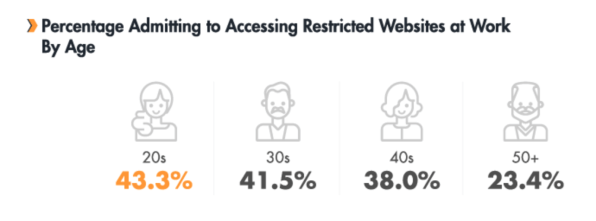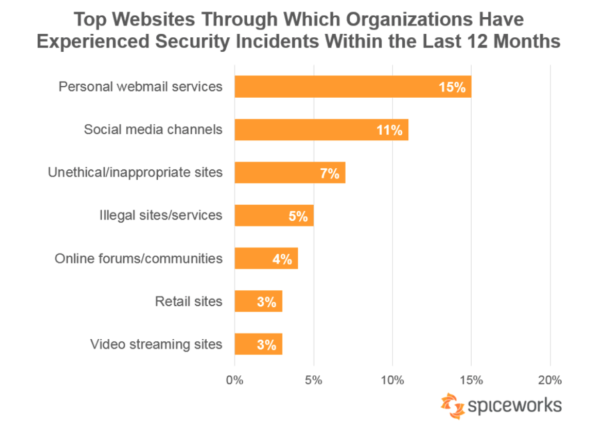Blocked Access Social Media Productivity
Employers may restrict access to certain websites in gild to guard against very real cyberthreats, but the exercise has its downsides, too. Many also end up blocking harmless content, and tin can potentially affect productivity, co-ordinate to research.
In a recent study by TheBestVPN, 64% of employees reported that their company used a firewall to restrict access to certain websites. Despite this, ii in 5 employees admit to accessing them anyway, often while on intermission and sometimes fifty-fifty to attain a work-related task.
The study plant that the bulk of organizations that apply this technology exercise and then to restrict access to websites with mature or illegal content, gambling websites, dating sites, and unsecured websites. "Those acme few nowadays obvious risks to a company's network and maybe their security," explains Joey Morris, who is part of TheBestVPN's creative team and the author of the study. "Information technology'due south really difficult to imagine a possible use of those websites that would exist beneficial to any employee's productivity."

The gray areas
The instance for restricting access to some of the other nearly commonly blocked websites, however, is less clear cut. According to the study, merely over half of employers who apply firewalls block access to social media and gaming websites, 35% cake access to video streaming services, and nearly 32% restrict access to music streaming platforms. Furthermore, over a quarter prevent admission to online shopping websites, 21% restrict admission to file-sharing websites, and 17% block instant messaging awarding.

Is blocking constructive?
In 2009, Ann Cavoukian, and so-privacy commissioner for the Canadian province of Ontario, called blocking social media at work a "mistake." "It'southward like waving the proverbial carmine flag in front of your staff," she said. "It's almost a challenge to them to find a style around information technology."
Over a decade subsequently, the TheBestVPN's study has proven her correct. Information technology establish that despite their employers' all-time efforts, 40% of employees have found ways to admission restricted websites. Most often this is done through a mobile device, and the practice is most common among younger workers.
When asked why they circumvented their company's firewall, more lxxx% said information technology was to use during a suspension, 46% said they were but passing fourth dimension due to a lack of piece of work, and 36% did so to tackle a modest errand. Mayhap most concerning to employers, however, is that nearly xviii% accessed restricted content in guild complete a piece of work assignment.
The instance for more than access
What might seem similar fourth dimension-wasters on the surface may actually prove to exist important enablers of productivity in the long run. Studies have shown, for example, that listening to music at work tin improve mood and increase productivity, and other inquiry has found that workers are near productive when they are able to occasionally do "non-work stuff" online.
Morris adds that as people go more than accepted to using digital tools in their personal lives—such as file-sharing websites or instant messaging—they often want to use those same tools in the workplace.
"While they might not be a tool your company uses department-wide, they're tools people apply personally for their ain organisation or work styles," he says.
Morris adds that instructional or educational videos can be a applied resources in both our personal and professional lives, and that employees often want to use the same instant messaging applications they apply at home for piece of work-related conversation groups. He also argues that social media can be a powerful tool for growing and maintaining professional networks.
The case for less access
There's an old adage in the IT security industry that says the biggest security threat isn't software, information technology's people, and studies have proven that to be true. In fact, one such study found that more than 99% of attacks require human interaction to succeed, such as convincing a user to download a malicious piece of malware, visit an unsecured website, or open an email attachment containing a virus.
According to a recent report by Spiceworks, 90% of organizations that restrict websites on corporate networks do so to protect against such threats, while 83% practice and so to prevent "unacceptable user behavior."
"You lot can spend all this coin on software and hardware that protects your network, but all information technology takes is one person to click on a shady link and your entire network could exist infected by malware—or worse, ransomware—that brings your visitor to a grinding halt," explains Peter Tsai, a technology annotator for Spiceworks and writer of the report.

Tsai explains that for those tasked with keeping their company's computer systems upwards and running, information technology's vital to restrict admission to websites that might compromise the entire network, or make it easier for malicious actors to compromise visitor assets.
"Imagine you're a company with merchandise secrets or sensitive customers information or other types of data that are regulated, and if information technology gets out, you'll become fined millions of dollars," he says. "If you permit your employees to use whatever file-sharing sites they want to, or any instant messaging platforms they like, they might be sharing company secrets over Facebook Messenger."
With regards to music and video streaming services, Tsai explains that they're often blocked in order to foreclose bandwidth issues, which 46% of companies cited as a reason for restricting admission to certain websites in his written report. "If fifteen people at your company are streaming 4K videos at the aforementioned time, it could bring your network to a crawl, because all of that bandwidth is being used up," he says.
How firewalls impact employer-employee relationships
Shel Holtz has heard many of these rationales in the by, and he isn't buying it. Now the director of internal communication for Webcor, he'southward spent much of his career speaking and writing against the apply of firewalls in the workplace.
He recalls a time when his employer restricted admission to fax machines out of fearfulness that it would brand it also easy for staff to steal confidential documents. Holtz adds that he heard the same rationale for limiting access when email was introduced, and once more near recently during the argue over social media access at piece of work. "Information technology'due south something we've seen with virtually every new applied science that'due south been introduced into the workplace," he says.
Holtz expresses like frustration over the argument against misuse of visitor bandwidth, equally information technology reminds him of similar arguments made when fax machines and copiers were get-go introduced. "Bandwidth is the new paper," he says. "Perhaps you lot need to consider increasing the amount of bandwidth you have for employees—information technology's not that expensive. Simply saying information technology's some sort of finite commodity strikes me as a little disingenuous."
Holtz adds that it's important for organizations to consider whether information technology's really necessary to block websites that pose less of a direct threat, equally it can have a negative impact on morale, loyalty, and productivity.
"It's a hit to engagement," he says. "You hired me, you lot told me how of import I am, but you don't trust me as far equally you can throw me? You're going to lump me in with every other employee, so I can't cheque in with my wife during the twenty-four hours over Facebook Messenger?"
Overall, Holtz believes transparency is the best policy in order to maintain employee trust when websites really practise need to exist blocked. "Disclosure covers a lot," he says, calculation that if a company really needs to block a website they better exist able to communicate a good reason as to why, or staff will just find a way to get around the firewall.
0 Response to "Blocked Access Social Media Productivity"
Post a Comment